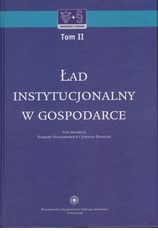WPŁYW KOORDYNACJI NA RYNKU PRACY NA EFEKTYWNOŚĆ MODELU GOSPODARCZEGO
THE INFLUENCE OF CO-ORDINATION ON LABOUR MARKET ON THE EFFECTIVENESS OF AN ECONOMIC MODEL
Author(s): Grażyna BukowskaSubject(s): Business Economy / Management, Labor relations, Political economy, Financial Markets
Published by: Wydawnictwo Naukowe Uniwersytetu Mikołaja Kopernika
Keywords: labour market; coordination; economic model; political economy; liberal market economies;
Summary/Abstract: The goal of this paper is to compare models of political economy. I use Hall coordination index to confirm the institutional features of liberal and coordinated market economies. In coordinated markets economies firms depend more heavily on non-market relationships to coordinate and to construct their core competencies. These non-market modes of coordination are generally based on more extensive relational or incomplete contracting, and network monitoring inside networks. In liberal market economies firms coordinate their activities through hierarchies and competitive market arrangements. Political economy is a terrain populated by multiple actors: individuals, firms, producer groups, and governments. However, this is a firm-centered political economy that regards companies as crucial actors in a capitalist economy. They are the key agents of adjustment in the face of technological change or international competition whose activities aggregate into overall levels of economic performance. In both economies reveal institutional complementarities across the sub-sphere of macroeconomics. It can explain cross-national differences in the change of institution and efficiency. It confirms the impact of complementarities on rates of growth in a system of labor market regulation.
Journal: Ekonomia i Prawo. Economics and Law
- Issue Year: 2/2006
- Issue No: 1
- Page Range: 113-124
- Page Count: 12
- Language: Polish

